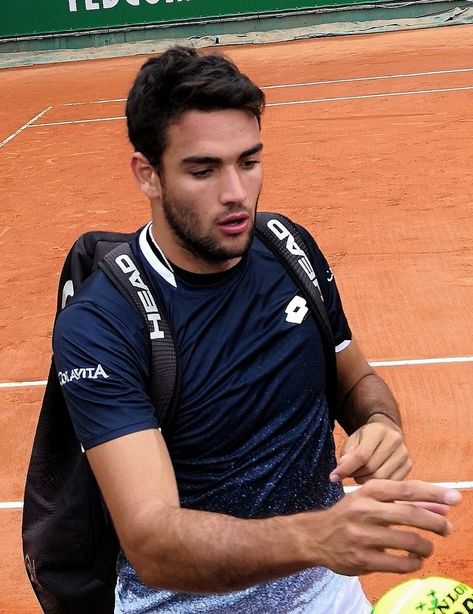Introduction:

In a world where athletes are often portrayed as unbreakable titans of mental and physical strength, Matteo Berrettini’s emotional revelation about his mental health struggles has shaken the tennis world — and for good reason. The former Wimbledon finalist, once seen as one of Italy’s brightest athletic icons, recently admitted, “I was at my breaking point.”
This rare moment of vulnerability from a top-tier athlete is more than just a personal confession — it’s a wake-up call for the sporting community and society at large. In this blog, we’ll dive into Berrettini’s mental health journey, answer the most frequently asked questions about athlete mental wellness, explore why this moment is so important, and provide actionable insights on how conversations like these can transform mental health awareness in sports.
Body:
1. Who Is Matteo Berrettini, and Why Does His Story Matter?
Matteo Berrettini is not just any tennis player. He’s a Grand Slam finalist, ATP titleholder, and once ranked in the world’s top 10. With a booming serve, charismatic demeanor, and fan-favorite status, he quickly became a household name — especially after his incredible run to the Wimbledon final in 2021.
But behind the trophies and applause, Berrettini was quietly battling inner demons. In recent interviews, he opened up about severe emotional exhaustion, self-doubt, injuries, and the pressure of expectations that nearly pushed him to quit the sport altogether.
This matters because athletes, like Berrettini, are often expected to perform flawlessly, leaving no room for vulnerability or breakdowns. His honesty disrupts that dangerous narrative.
2. “I Was at My Breaking Point” — What Did Berrettini Reveal?
In a candid discussion with Italian media and several international outlets, Berrettini said:
“I was pretending I was okay, but I wasn’t. I was at my breaking point — physically, emotionally, and mentally.”
He described long periods of injury, isolation, and overwhelming anxiety. He admitted that he questioned whether he wanted to continue playing tennis and struggled to find motivation even to get out of bed some days.
These raw admissions underscore the unseen mental toll behind the glamorous tennis lifestyle. It also highlights the importance of breaking the stigma around mental health in elite sports.
3. What Are the Key Triggers of Mental Health Struggles in Professional Tennis?
Mental health issues in professional tennis — and sports at large — are often caused by a combination of factors:
- Injuries and Physical Limitations: Long recovery times can lead to frustration and identity crises.
- Isolation: Touring globally means athletes are often away from home and loved ones.
- Pressure to Perform: Rankings, sponsors, and fans create relentless expectations.
- Public Scrutiny: Social media adds constant judgment, especially after poor performances.
- Uncertainty: One injury or poor season can drastically alter a career.
According to the International Olympic Committee (IOC), over 35% of elite athletes experience mental health crises, ranging from burnout and anxiety to depression and eating disorders.
4. Why Is Matteo Berrettini’s Admission So Important?
Berrettini’s story stands out because it’s real, raw, and relatable. Here’s why it’s pivotal:
- Shattering the Silence: By speaking out, he gives others permission to acknowledge their pain.
- Redefining Strength: Mental health doesn’t negate toughness — it defines it.
- Opening Conversations: His honesty encourages fans, media, and institutions to address athlete wellness proactively.
- Championing Change: Stories like his could inspire tennis organizations to implement stronger mental health policies.
As tennis legends like Naomi Osaka and Mardy Fish have also shared, even the most accomplished athletes are not immune to mental health struggles.
5. Frequently Asked Questions (FAQs):
Q1: What mental health challenges are most common among professional athletes?
- Anxiety, depression, burnout, insomnia, eating disorders, and PTSD are prevalent.
- A study published in the British Journal of Sports Medicine noted that up to 34% of elite athletes face symptoms of anxiety and depression.
Q2: How are sports organizations responding to mental health crises?
- Some organizations, including the ATP and WTA, are now offering mental health support hotlines, therapy, and mindfulness training.
- However, critics argue that implementation is inconsistent and more proactive measures are needed.
Q3: What can fans and the media do to support athletes’ mental well-being?
- Avoid toxic criticism on social media.
- Celebrate vulnerability and recovery, not just wins.
- Respect privacy during recovery periods.
Q4: What are signs an athlete may be struggling mentally?
- Sudden withdrawal from competitions
- Decline in performance with no physical injuries
- Emotional outbursts or uncharacteristic behavior
- Long social media absences or cryptic posts
Q5: How can young athletes manage mental stress early in their careers?
- Develop strong support systems.
- Work with sports psychologists.
- Set boundaries and realistic goals.
- Prioritize self-care and downtime.
6. 5 Key Lessons from Berrettini’s Mental Health Journey
- Mental health is not a weakness — it’s part of the athlete’s overall well-being.
- Early intervention is critical — ignoring symptoms worsens outcomes.
- Open dialogue saves careers — silence only deepens the pain.
- Social media scrutiny is brutal — athletes must be digitally protected.
- Support systems are vital — family, coaches, and mental health professionals must work in sync.
7. A Growing Movement: Other Athletes Speaking Out
Berrettini joins a growing list of champions who have chosen transparency over silence:
- Naomi Osaka: Took multiple breaks from tennis citing anxiety and media pressure.
- Simone Biles: Withdrew from Olympic events to prioritize her mental health.
- Michael Phelps: Spearheaded mental health advocacy after battling depression.
- Nick Kyrgios: Spoke out about suicidal thoughts and loneliness during the pandemic.
These stories aren’t just inspirational — they’re essential to changing the toxic culture of “push through the pain.”
8. The Business of Athlete Wellness: Why Brands Should Pay Attention
Mental health is now central to athlete branding. Sponsors and media outlets are realizing that an emotionally resilient athlete is a valuable long-term investment.
- Authenticity attracts loyalty.
- Empathy drives engagement.
- Transparency builds trust.
When athletes like Berrettini speak out, their personal brand doesn’t weaken — it evolves. This shift creates a new market for wellness sponsors, mental health tech, and supportive training environments.
9. 3 Urgent Strategies Tennis Must Implement Now
- Mandatory Mental Health Training: Coaches, trainers, and team staff must be educated on psychological first aid and mental health literacy.
- Year-Round Psychological Support: Embed licensed therapists in every ATP/WTA event and provide remote access for off-season.
- Mental Health Rest Periods: Just like physical injury breaks, players should be able to take mental health breaks without ranking penalties or stigma.
Conclusion:
Matteo Berrettini’s powerful declaration — “I was at my breaking point” — is more than just a personal truth; it’s a turning point for tennis and sports culture. His courage in confronting his mental health struggles publicly gives hope to countless athletes and fans alike who may feel invisible or unsupported.
The message is clear: no trophy is worth a life unraveling behind the scenes. The world must now rise to meet the moment — by listening, learning, and leading change in how we approach mental health in sport.
The next time you see an athlete on TV, remember: behind that serve, that sprint, or that shot is a human being fighting battles we may never see. Let Berrettini’s story remind us all that it’s okay to not be okay — and even champions need help sometimes.


